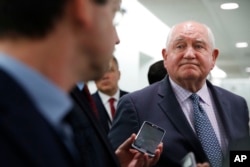American farmers will receive up to $12 billion in emergency relief as compensation for expected financial losses caused by the trade policies of President Donald Trump.
The direct assistance, announced Tuesday by the Department of Agriculture, comes amid tariffs imposed by the Trump administration and retaliatory measures of other countries that are expected to cost U.S. food producers billions of dollars.
“The actions today are a firm statement that other nations cannot bully our agricultural producers to force the United States to cave in,” agriculture Secretary Sonny Perdue told reporters during a conference call announcing the program. “This administration will not stand by while our hardworking agricultural producers bear the brunt of unfriendly and illegal tariffs.”
White House officials contend the tariffs inflict some necessary minor, domestic short-term pain in order to achieve long-term large gains for the U.S. economy.
Farmers hard hit
Especially hard hit — producers in the American heartland who find their pork, soybeans and other products too expensive to be competitive.
They will now get help from the Commodity Credit Corporation, a federal program that helps American farmers by buying their crops. Officials say the program does not authorize any new funds and thus needs no approval from Congress. The aid, expected to be short term, would come in the form of direct payments, purchases of excess crops and trade promotions, according to the Agriculture Department.
“This is a short-term solution that will give President Trump and his administration time to work on long-term trade deals,” Perdue said.
Tuesday’s announcement of the emergency aid comes less than four months before congressional elections in which the majority-Republicans, including some in farms states, find themselves vulnerable to Democratic Party challengers who are rising in the polls.
Many lawmakers would prefer Trump lift the tariffs, rather than provide bailouts.
“Our farmers want trade, not aid,” declared Rep. Kevin Cramer, a Republican from North Dakota, a state where agriculture alone accounts for one-fourth of the revenue base.
“This trade war is cutting the legs out from under farmers, and the White House’s ‘plan’ is to spend $12 billion on gold crutches,” said Sen. Ben Sasse, a Republican from Nebraska, where beef and corn are the top agricultural products. “This administration’s tariffs and bailouts aren’t going to make America great again. They’re just going to make it 1929 again.”
Sen. Bob Corker, a Republican from Tennessee, where soybeans are the top row crop, said, “You have a terrible policy that sends farmers to the poorhouse, and then you put them on welfare, and we borrow the money from other countries. It’s hard to believe there isn’t an outright revolt right now in Congress.”
A Democratic House member, Jackie Speier, whose prosperous California district is known for its Brussels sprouts and grape production, wrote on Twitter: "OK @POTUS -- you created this mess with your trade war and now you are going to spend $12 billion to placate the farmers that voted for you.”
“It does not make any sense to me as an economist,” says Ohio State University professor Ian Sheldon, predicting the action will distort international commodity markets and possibly trigger a dispute filing at the World Trade Organization.
“This policy is a transfer from taxpayers to farmers, all to make up for the U.S. starting a trade war in the first place,” Sheldon, whose focus is analysis of international trade and policy, told VOA. “Farmers in my state have made it clear that they want to be able to compete for export market share, as opposed to getting government subsidies.
"In addition, the cost of the subsidies will add to the budget deficit, which in turn will most likely increase the trade deficit further. This smacks of policy incoherence to me,” he added.
U.S. agricultural trade groups are also reacting with limited enthusiasm.
“While soybean growers appreciate the administration’s recognition that tariffs have caused reduced exports and lower prices, the announced plan provides only short-term assistance,” the American Soybean Association said in a statement, which called “for a longer-term strategy to alleviate mounting soybean surpluses and continued low prices, including a plan to remove the harmful tariffs.”
'Expand markets, develop new ones'
ASA president John Heisdorffer, who is a soybean grower in the state of Iowa, said, “Our best course of action is to expand other markets and develop new ones to buy the soybeans we’re not selling to China. This means finishing the NAFTA negotiations (with Canada and Mexico) as soon as possible so we can begin talks on new bilateral agreements with other key soybean markets, including Japan, Vietnam, Indonesia and the Philippines.”
Mark Santucci, a farmer of tart cherries in the state of Michigan, told VOA that while the relief programs will not directly benefit him, “I am glad the president has decided to implement it. I think we are in for a long battle with the Chinese government, so this program will go a long way in helping our farmers who are on the front line.”
Since discussion of a tit-for-tat exchange of tariffs between the U.S. and China became serious in late May, U.S. soy prices have dropped more than $2 per bushel.
Trump tomorrow is to meet with European Commission president Jean-Claude Juncker, who will try to dissuade the U.S. president from escalating the trans-Atlantic trade conflict.
Their meeting will focus on “a wide range of priorities, including foreign and security policy, counterterrorism, energy security and economic growth,” according to the White House.
The trade aspect was clearly on the president’s mind on the eve of the meeting. Trump told veterans in Kansas City, Missouri, that “what the European Union is doing to us is incredible, how bad.”
Trump also said of European leaders talking trade: “They sound nice, but they’re rough."
Earlier in the day, Trump tweeted, “Tariffs are the greatest!”







